|

Manthri Hatana:
Battle of the ballot
Reviewed by Kalakeerthi Edwin Ariyadasa
The title titillates.
The reader dives into the work, his mind filled with all the images,
conjured up by the expression "hatanas" (battles) that are usually
unleashed in election campaigns.
He is in for a pleasant and exceedingly entertaining surprise.
 The reader plunges into "Manthri Hatana", and casts about for those
attacks, fights, gang-wars, flag-destructions etc., that are considered
the norm in election campaigns. He will miss them, of course. But, he
will find instead a hilarious series of episodes, that will set the
reader roaring with laughter. Here, the staple is political satire,
delivered in an idiom, that unerringly impacts upon the mind of the
reader. The reader plunges into "Manthri Hatana", and casts about for those
attacks, fights, gang-wars, flag-destructions etc., that are considered
the norm in election campaigns. He will miss them, of course. But, he
will find instead a hilarious series of episodes, that will set the
reader roaring with laughter. Here, the staple is political satire,
delivered in an idiom, that unerringly impacts upon the mind of the
reader.
The "Battle of the Ballot" that many are familiar with, is described
generally as "Election Violence." But this, exhilarating exploration of
the humorous layers of Sri Lankan electioneering, is an entirely fresh
experience for all those, who have known only one single dimension of
these Battles of the Ballot.
The personalities, situations and conflicts that occur in this work,
are all work-a-day material in the field of Sri Lankan elections. But,
prior to this writer, hardly any other chronicler of election campaigns
in Sri Lanka, has had the keen observation, to discover the humour and
down-right fun, implicit in this serious activity of fighting elections.
The author Saman Weeraman, infuses a dramatic depth, to the routine
events that are an integral part of the elections in this country. You
may very well ask, why on earth did we not see all this humour before.
At the end of it all, it is just a matter of view-point. Author Weeraman,
has a built-in capacity to extract those situations that are ripe with
potential satire.
Even when the satirical situation can yield only an incipient touch
of humour, he has the skill to blow it up into dramatic and massive
proportions.
The processes of an election campaign have been articulated in this
work, into a series of dramatic scenes. The drama begins, with Charles
Obeysekera, making up his mind to present his nomination papers as a
candidate. From then on, humour takes over, as the player of the lead
role.
The narration grips the reader into absorbed reading. He is
helplessly caught up in the flow of the story-line and is wafted along.
Author Saman Weeraman, exploits quite effectively, the vast store of
experiences he has garnered in a prolonged career of practical politics.
He has had the added advantage of being actively involved in cinema
and television. He is a well-known script writer and incidentally has
directed the serialised teledrama of the same title.
An Attorney-at-Law, author Saman Weeraman, was at one time a member
of the Southern Provincial Council. He is fully aware of the lectic
give-and-taking of active politics.
He was an executive officer in the public sector. He had a spell as
the General Manager of the National Film Corporation. This has enabled
him to acquire a practical grasp of the administrative and legal aspects
of entertainment industries.
He left the hustle and bustle of politics, when he became fully aware
that his conscience would not adept to reering fluctuations of popular
Sri Lanka politics.
His erst-while political colleagues and his voters tend to talk about
him as a gentleman politician.
His current work of fiction - the political satire titled "Manthri
Hatana" is, in effect a folk-tale relating to the volatile sub-culture
generally dubbed as campaigning for elections. He has been in the thick
of it. In consequence, he can discern the humour-rich inner workings of
this mass ritual.
The aspect of his work which has special relevance to our time, in
the hideous battle for the preference vote.
My considered view is that, author Saman Weeraman's "Manthri Hatana"
(Battle of the Ballot) endows upon the reader a profound awareness of
the reality of mass election processes. What he gives here, in a humour
laced narration, has greater appeal than a treatise on elections.
The philosophic implication of this, is the communication of the
futility of some these songs-on in the name of the practice of
democracy.
I would recommend the use of this book, as a household companion.
The elders can read out section of this work, to prevent the minds of
the members of a given family from experiencing an inner pain, observing
the repulsive practice of politics, in some instances. 'Manthi Hatana'
(Battle of the Ballot) is humour at its telling best
Simple tool for designing foundations
Reviewed by Eng. Preminda Wijesurendra
Every engineer designing foundations gradually realises the
limitations placed upon the exactness of the final product, from the
envisaged mathematical model, intended or abstracted at the commencement
of such a design.
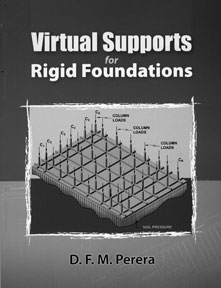 |
|
Virtual Supports for
rigid Foundation
Author: D. F. M. Perera
A Sarasavi Publication |
This inexactness increases gradually from Pad-Combined-Strip-Raft in
an ascending nature. While several geometrical attributes are altered to
make the reality resemble the analytical model as closely as possible,
there is no way to alleviate this disillusionment of being unable to
create a back to back foundation design, such as is, in the case of
Superstructures.
A problem herein is in the fact that while engineers are capable of
assessing the Loading Patterns of a Superstructure to a very high degree
of accuracy, they are unable to set the same degree of accuracy to the
Soil Reactions acting upon foundations of such structures, although such
Reactions are the result of that same Loading Pattern referred to above.
As a reflection of this difficulty, it is an established
understanding that, while the many "Structural Analytical Computer
Programmes" yield exact results for Superstructures of Buildings,
Retaining Walls, Bridges and Silos - the foundation aspect of these are
only an approximation, based upon the numerous assumptions that are
forced upon the engineer, to achieve a tangible result.
What Eng. D. F. M. Perera has done, has its real value in relieving
the engineer of this - feeling of inexactness - by incorporating a
pseudo condition in the analytical data that is fed into the computer,
and thereby forcing the computer model to proceed as in the case of a
Superstructure and yield a result that is very highly compatible with
the real Loading Pattern. As expressed at the launching ceremony of the
book, he has "provided a virtual system of statically determinate
alternate supports to an existing system of forces already in
equilibrium, while defining it to be of null value, so that the original
equilibrium is undisturbed. Then the computer is forced to proceed and
analyse it as a normal problem".
Although the conceptual explanation of how this method works may
sound complicated and baffling, the user of this method will find the
tool suggested in his book through the various worked examples, to be
very simple and forthright when in use.
This I believe is of paramount importance of any tool, becoming
popular in its usage in the present day context.
On that note engineers who are faced with designing foundations will
no doubt benefit from the use of this extremely simple tool that has
been named "Virtual Supports", because it provides exact results, and
thereby allows them to investigate the cost-effectiveness of each of
their selected solutions for a particular foundation problem with ease.
Timely bilingual book on law
Reviewed by Dr. Lalitha S. Fernando
E.D. Palihapitiya's latest publication is a bilingual book entitled
Constitutional and Administrative Law that contains 21 Chapters full of
the most vital legal information on law that any student of law would
ever require. The book contains 332 pages of information covering
critical legal principles, monumental cases and case law and an in-depth
analysis of specific principles of law from legal education and social
science perspectives.
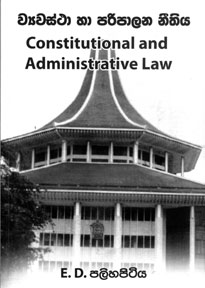 |
|
Constitutional and
Administrative Law
An author
publication
Author:
E.D. Palihapitiya |
There are novel features introduced in this work. The first is its
bilingual nature that allows readers and students of law to grasp the
different linguistic jargon associated with each area of law. The author
also provides a summary and assignments for readers and a list of books
for further reading after each Chapter.
The first Chapter deals with the topic 'what is Law?' which is
eloquently written in both Sinhala and English and expalins law as human
experience, as a science not made but found, and a science that enhances
development. Law is described as a force that affects human life from
womb to tomb and its effect on placing limits on human conduct. Law is
also discussed as a binding force in society that enables human
progress. This Chapter briefly examines the importance of law in
everyday life of any person as a citizen. It also kindles some interest
in the minds of beginners to the subject of law.
The second Chapter deals with 'Constitutional Law' with reference to
the present Constitution of Sri Lanka and the functions of a
Constitution in general. The author discusses the functions of a
Constitution under several subheadings such as, Constitution as a
Charter, guardian of Fundamental Rights, the law behind the law and an
instrument controlling government. Chapter three deals with the Doctrine
of the Separation of Powers' while the fourth Chapter deals with the
'Legislative Supremacy of Parliament.'
The 'Rule of Law' is explained through living examples in the fifth
Chapter by unearthing the factors affecting the establishment of the
Rule of Law in a country. Chapter six discusses the 'Independence of the
Judiciary' with new facts. This Chapter is followed by a Chapter on
'Legislative Power' (Chapter 7). Chapter eight deals with the 'Executive
President' comparing the executives of the previous two Constitutions.
Chapter nine discusses the role and functions of the Judiciary within
the court system. For those who are interested in 'Administrative Law',
Chapters ten, eleven and twelve are important. The Chapter on 'Natural
Justice' clearly presents the most fundamental principles of law easily,
understood by a beginner.
In Chapter twelve, 'Discretionary Power' is discussed. In Chapter
thirteen, Common Law Rights and Fundamental Rights' are explained with
cases. Chapter fourteen deals with 'Judicial Review of Administration'
with remedies available to any violation of rights. Chapter fifteen
discusses the Electoral System in Sri Lanka' and its defects and
possible remedies. Chapter sixteen is devoted to the 'Decentralization
of Administration' and Chapter seventeen focuses on 'Local Government
institutions'.
Chapter eighteen explains the importance of Tribunals to run an
efficient adminstration in a country.
Chapter nineteen deals with the 'Ombudsman' and Chapter twenty
discusses 'Public Corporations.' Chapter twenty one is devoted to a
discussion of concepts like Democracy, Unitary Government, 'Federal
Government and Sovereignty'.
Palihapitiya is a graduate in Public Administration and a practising
lawyer for 28 years who has made legal education accessible to a broader
audience for decades through his teachings at various educational
institutions including the University of Sri Jayewardenepura and several
other universities in Sri Lanka.
Anyone interested in learning the law may be grateful to Palihapitiya
for bringing forth a book which will fill a much needed vacuum in the
field of legal education in both the Sinhala and English languages.
(The writer is a Senior Lecturer, Department of Public
Administration, Faculty of Management Studies and Commerce, University
of Sri Jayewardenepura.)
A tribute to Amaradeva
by Jaliya Wijeyekoon
Most Sri Lankans, irrespective of caste, creed or race who love music
are indulged happily in the beautiful songs of Pandit W. D. Amaradeva
but quite a number of us, including the educated youth really understand
what are the meanings of his joyful songs bring. More often than not,
they sing without realising that it means more than what we think about
it. The debth of meaning and intricately woven lyrics bring out
Amaradevas emotional connection with the audience and brings a more
emotional aspect in the listner's mind.
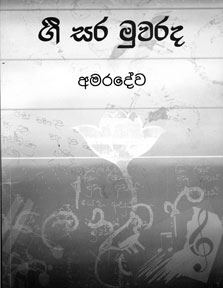 |
|
Edited by W. A.
Abeysinghe
Gee sara Muvarada |
With the art of meaning in mind, Dr. Jagath Asoka made his duty to
offer a tribute to Amaradeva by publishing a book, "Gee Sara Muwarada"
with the renowned musician's songs and meanings for the benefit of
Amaradeva's fans.
Dr. Asoka's love for Amaradeva's songs began 35 years ago when he was
a student and continued to prove strong even after he domiciled in
America Asoka said," When I listen to your songs, I am in my own heaven.
I have fallen in love not only with your duket voice but also with the
mellifluous lyrics! He said that even though he found it difficult to
understand some words, his soul still resonates with those poetic verses
when he listens to them.
So with this book, which illustrate the meanings of all songs will
certainly enhance this enjoyment of Amaradevas fans.
According to Asoka, the goal of the book is to explain the meanings
of the lyrics in the songs using simple Sinhala terms and also has
phrases in English. In addition to this, a history of how Amaradeva's
songs composed, how they were inspired and in what way the songs were
finally produced with their soulful melodies is explained properly,"
Asoka said.
Dr. Jagath Asoka is delighted with the success of his attempt and
extends his profound gratitude to Pandit Amaradeva and Mrs. Wimala
Amaradeva for heading to his request.
Dr. Jagath Asoka produced the book and published proving his
admiration and respect for Amaradeva.
Intimate letters of a great Buddhist monk
Reviewed by Andrew Scott
Unpublished letters of Ananda Maitreya Mahanayaka Thera
Author: Samudra Wettasinghe
Translator: Delicia Tillekaratne
A Sarasavi Publication
Ananda Maitreya Mahanayaka Thera is a great religious personality
that Sri Lanka produced in recent times. Enduring many hardships and
obstacles he bloomed out to be a much respected and much talked of Thera
in Sri Lanka as well as throughout the Buddhist world.
The Unpublished Letters of Ananda Maitreya Mahanayaka Thera by
Samudra Wettasinghe, a close friend and follower of the Thera, was
published this year. The English translation has been ably done by
Delicia Tillekaratne who has recently earned the respect and regard of
English readers as a translater who uses a simple and clear diction
which can be easily understood by even the school going population of
Sri Lanka.
Undoubtedly the simplicity of language a translator uses greatly
assists the translation to reach a wide readership and eventually it
will become a very popular effort that would be appreciated by all
readers. The translater, Delicia Tillekaratne, is an honours graduate in
science from the University of Peradeniya and throughout the book she
has done a very faithful translation of Unpublished Letters of Ananda
Maitreya Mahanayaka Thera.
In the foreword to this book the author Samudra Wettasinghe says: "I
am neither an indiscriminate religious devotee nor do I chase the
shadows of popular monks with blind and unquestioning faith. However, I
live with boundless devotion to a particular pundit monk, whose
qualities at times I believe, have superseded human nature. He is none
other than the late Agga Maha Panditha Prof. Balangoda Ananda Maitreya
Mahanayaka Thera."
From time to time both in the east and in the west the private
letters of great personalities have been published and they give us a
vision of some great personalities and they always provide very
informative and inspiring reading material. Likewise the publication of
Unpublished Letters of Ananda Maitreya Mahanayaka Thera mirrors the life
and activities of this great spiritual leader and it also serves as a
great source of inspiration to all those who are bent on the uplift of
their spiritual values.
Samudra Wettasinghe, an Honours graduate in Sinhala and Mass Media
from Sri Jayewardenepura University is an able Sinhala writer who had
won many coveted literary awards.
This neatly brought out book with an attractive cover design by Saman
Indika Lokukaluge depicting Ananda Maitreya Mahanayaka Thera comprises
15 intimate letters written by this great prelate to a deeply respected
student and admirer of his mission and covers a broad spectrum of
subjects, both personal and social. These letters also show that the
Mahanayaka Thera practised what he preached and his forte has been
meditation.
These letters also show that the great prelate followed a simple
meditative lifestyle which is the greatest need of the hour throughout
the world today.
It is both interesting and educative to read some observations of
Ananda Maitreya Mahanayaka Thera on various topics in some of his
unpublished letters. About the great philosopher Krishnamurthi whom he
greatly respected this prelate writes: "Krishnamurthi is the greatest
preacher born during this century who preached to the world the
knowledge he comprehended, without bias or prejudice, or bondage or
slavery to any philosophy or religion."
Writing about Dr. E. W. Adikaram, one of his devoted Pali students he
says:" Dr. Adikaram was a gentle and kind-hearted person. One day when I
went to his home, while his car was there, he was waiting for someone
else's to go somewhere.
Book skimmer
Sirilaka Kurulu Vatha
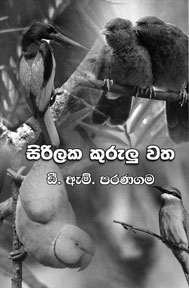
D.M. Paranagama's Sirilaka Kurulu Vatha gives a detailed account of
Sri Lankan birds such as the lily trotter, flamingos, hornbill, peafowl,
Ceylon babbler,jungle fowl,jungle crow, koel bird, and devil bird.
This is a Godage publication.
Sarasavi Sinhala- Sinhala Dictionary

Sarasavi Sinhala-Sinhala Dictionary containing more than 85,000
entries was launched at the International Book Exhibition. It is a
Sarasavi publication.
Book launch
Sanskruthiya Sannivedanaya ha Nirmanaya
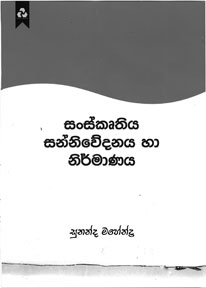
Prof. Sunanda Mahendra's latest book on mass communication entitled
Sanskruthiya Sannivedanaya ha Nirmanaya will be launched at Dayawansa
Jayakody Book Exhibition Hall, Ven. S. Mahinda Mawatha, Colombo 10 on
September 28 at 10 a.m.
This is a Dayawansa Jayakody publication.
New arrivals
A series of novels by Prof. Mahasara Gunaratne. The books are in the
genre of mystery and thrillers and noted for their langauge and
presentation.
|

